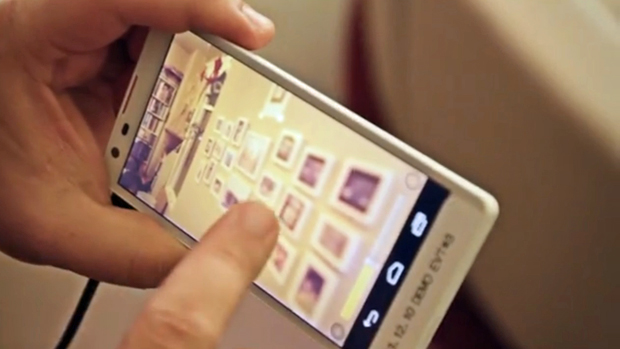Project Tango: Google unveils 3D-smartphone - video
New Google motion-tracking device codenamed Project Tango could help blind people navigate

A free daily email with the biggest news stories of the day – and the best features from TheWeek.com
You are now subscribed
Your newsletter sign-up was successful
GOOGLE unveiled a new phone that can sense and record three-dimensional environments, opening up new possibilities for mapping, virtual-reality gaming and applications for the blind.
The phone mobile, codenamed Project Tango, was released this week to a small group of developers who Google hopes will create new software for the device.
Tango was designed by Google's Advanced Technology and Projects group - a team the tech company inherited when it took over Motorola in 2011.
The Week
Escape your echo chamber. Get the facts behind the news, plus analysis from multiple perspectives.

Sign up for The Week's Free Newsletters
From our morning news briefing to a weekly Good News Newsletter, get the best of The Week delivered directly to your inbox.
From our morning news briefing to a weekly Good News Newsletter, get the best of The Week delivered directly to your inbox.
The project was devised in collaboration with universities, research labs and industrial partners "to harvest the last ten years of research in robotics and computer vision [and] concentrate that technology into a very unique mobile phone", explains Johnny Lee, leader of Project Tango in a video released on YouTube.
The device is described by Google as "an exploration into giving mobile devices a human-scale understanding of space and motion".
What will it do?
In the release video, Google demonstrates a range of possible applications for the device, from allowing users to incorporate their living room into video games, to helping visually impaired people navigate with the assistance of audio cues from the phone.
A free daily email with the biggest news stories of the day – and the best features from TheWeek.com
"Imagine playing hide-and-seek in your house with your favourite game character, or transforming the hallways into a tree-lined path," says Google on its Project Tango web page. "Imagine competing against a friend for control over territories in your home with your own miniature army, or hiding secret virtual treasures in physical places around the world."
How does it work?
The handset is equipped with a motion-tracking camera and depth sensors to record movement through the physical world, the Wall Street Journal reports. "The five-inch phone has components that make more than a quarter million measurements every second, updating its position and orientation to create a 3D model of the space and objects around the user."
At the moment the phone has only been released to developers, but Google has invited people who think they may have an innovative application for the device to apply via its official website.
"The future is awesome," Lee says. "We can build it together".
-
 6 of the world’s most accessible destinations
6 of the world’s most accessible destinationsThe Week Recommends Experience all of Berlin, Singapore and Sydney
-
 How the FCC’s ‘equal time’ rule works
How the FCC’s ‘equal time’ rule worksIn the Spotlight The law is at the heart of the Colbert-CBS conflict
-
 What is the endgame in the DHS shutdown?
What is the endgame in the DHS shutdown?Today’s Big Question Democrats want to rein in ICE’s immigration crackdown
-
 Will AI kill the smartphone?
Will AI kill the smartphone?In The Spotlight OpenAI and Meta want to unseat the ‘Lennon and McCartney’ of the gadget era
-
 Has Google burst the Nvidia bubble?
Has Google burst the Nvidia bubble?Today’s Big Question The world’s most valuable company faces a challenge from Google, as companies eye up ‘more specialised’ and ‘less power-hungry’ alternatives
-
 How the online world relies on AWS cloud servers
How the online world relies on AWS cloud serversThe Explainer Chaos caused by Monday’s online outage shows that ‘when AWS sneezes, half the internet catches the flu’
-
 Is the UK government getting too close to Big Tech?
Is the UK government getting too close to Big Tech?Today’s Big Question US-UK tech pact, supported by Nvidia and OpenAI, is part of Silicon Valley drive to ‘lock in’ American AI with US allies
-
 Google: A monopoly past its prime?
Google: A monopoly past its prime?Feature Google’s antitrust case ends with a slap on the wrist as courts struggle to keep up with the tech industry’s rapid changes
-
 South Korea's divide over allowing Google Maps
South Korea's divide over allowing Google MapsTalking Points The country is one of few modern democracies where the app doesn't work
-
 Google avoids the worst in antitrust ruling
Google avoids the worst in antitrust rulingSpeed Read A federal judge rejected the government's request to break up Google
-
 Is AI killing the internet?
Is AI killing the internet?Talking Point AI-powered browsers and search engines are threatening the death of the open web